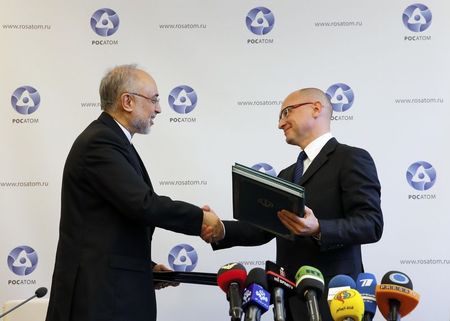By Thomas Grove
MOSCOW (Reuters) - A senior Russian diplomat expressed optimism on Wednesday that a deal could be reached this month between world powers and Tehran on curbing Iran's nuclear programme despite "deep gaps" on some issues.
Deputy Foreign Minister Sergei Ryabkov said Russia, which agreed on Tuesday to build up to eight new nuclear reactor units in Iran, was doing all it could to help secure the agreement which would provide assurances to the West that Tehran's programme was not intended to build weapons.
The six powers - the five permanent members of the United Nations Security Council plus Germany - and Iran face a Nov. 24 deadline for agreement that could also allow an easing of Western economic sanctions on Iran.
"We aren't looking at the possibility of not reaching a deal by Nov. 24," Ryabkov, who was present at the latest talks in Muscat this week, was quoted as saying by the Russian news agency Interfax. "We are focussed completely on the task before us, in so far as we have a chance, and it's not small. We can't miss (the opportunity)."
Russia has traditionally warmer relations than other powers leading the talks with Tehran, which says its nuclear work is for peaceful purposes. It is closely involved in developing Iran's nuclear energy programme, having already opened one generator in Bushehr.
One of the chief Western concerns is Tehran's capacity to refine uranium quickly that could open the way to arms production.
Iran confirmed it had tested a new centrifuge that could speed uranium enrichment, but dismissed suggestions this may have breached last year's interim deal with world powers.
That deal said Tehran could continue its "current enrichment R&D (research and development) practices", language that implies it should not expand them.
Despite Ryabkov's optimism, the talks in Oman's capital produced no big breakthrough.
"The main obstacles are the inability of all parties to build bridges over the still deep gaps on issues like enrichment and sanctions," Ryabkov said in Muscat on Tuesday
A U.S. State Department official said on Tuesday there was "more work to do" and Iran's top negotiator said he was "not in a position to claim that progress is achieved."
An agreement would, for Obama, provide a big foreign policy success and the incentive for Iran to secure a deal is that it would provide relief from economic sanctions.

(Reporting by Thomas Grove; additional reporting by Michelle Moghtader in Dubai, Editing by Timothy Heritage and Ralph Boulton)
